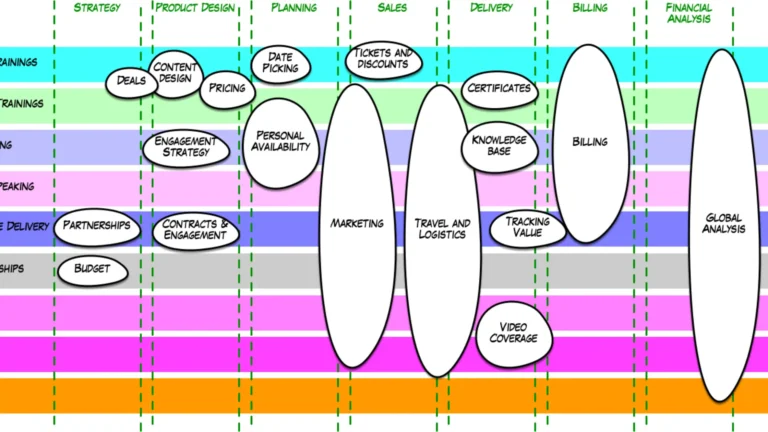What Does “We Stand on Business” Mean? An Exploration
The phrase “we stand on business” is used occasionally in various business contexts. What exactly does it mean when someone says, “We stand on business”? This article will look at the origins, definitions, and applications of this phrase in business settings.
The Origin and Literal Meaning
The phrase “we stand on business” is derived from procedural rules and phrases used in legislative assemblies. If leaders want to stop casual debate and redirect a group’s attention back to the official matters at hand, they can say, “We stand on business.”
Literally, “we stand on business” means that the current topic and activity should be relevant to the official or scheduled business. When someone says “we stand on business,” it means it’s time to put aside casual conversation and focus on the task, issue, or agenda at hand.
Use in Commerce and Management
The phrase “we stand on business” moved from politics to business contexts. Business managers and leaders use it to redirect a meeting or discussion back to core commercial issues. For example, if an informal meeting begins to deviate, a manager could say “I believe we should stand on business now” to bring things back on track.
“We stand on business” can also be used as a shorthand to indicate that personal opinions and tangents should be avoided in favor of focusing on data, facts, analytics, and other evidence-based business issues.
When discussions become dominated by emotions or personalities rather than evidence and reason, managers may use the phrase “we stand on business here” to anchor the conversation in statistics, data, and logic.
Signaling professionalism and results-oriented work
When employees and managers say “we stand on business,” they indicate that work is serious and results-oriented. The phrase “we stand on business” conveys professionalism; it shows that success is more important than egos or distractions.
In client-facing situations, “we stand on business” can reassure audiences that a company operates in a disciplined manner. For example, during a sales presentation, a speaker may say, “We stand on business” when discussing analytics, data, or commercial offerings. This demonstrates that the company prioritizes meeting customer needs over self-centered interests.
Respecting Time and Resources
“We stand on business” respects valuable resources such as time and money. When employees engage in excessive casual conversation, they waste company time and reduce productivity. “We stand on business” gets everyone back on track to using work hours as they were intended: for business. This helps businesses be more efficient and provide the most value per hour worked.
In project management contexts, noting “we stand on business” helps to prevent scope creep and feature bloat. It indicates that conversations should center on the resources that have already been allocated based on data and priorities. By focusing on defined requirements rather than meandering ideas, “we stand on business” leads to successful shipping on time.
Making Data-driven Decisions
“We stand on business” frequently indicates that decisions should be based on evidence and reasoning rather than gut feelings or hunches. When debates become circular or emotional, managers can intervene and say “we stand on business here” to ground the discussion in facts and projections.
Data-driven decisions promote growth and innovation. Grounding business operations in metrics, analytics, and KPI dashboards promotes continuous improvement. When everyone accepts “we stand on business” as a commitment to numbers, assumptions are challenged and progress is accelerated.
Promoting Inclusive and Ethical Operations
While “we stand on business” directs focus and decision-making toward commercial outcomes, it also emphasizes the importance of conducting business in an ethical and inclusive manner. All voices and stakeholders should participate in major decisions, ensuring that diverse perspectives are represented while strategy remains driven by compassion as well as profit.
“We stand on business” does not give businesses permission to ignore ethical considerations or marginalize impacted communities. Instead, it indicates that decisions must take into account both hard data and ethical concerns about society and the environment. To truly stand on business, operations must be conducted in a sustainable, moral, and beneficial manner for all.
Promoting direct and clear communication
Communication can break down when conversations lag, lose structure, or deviate from the intended path. “We stand on business” returns everyone to a state of clear, direct, and relevant communication. It eliminates awkward tensions that arise when off-topic banter impedes collaborative work.
Meetings can quickly lead to conclusions and action plans once the core focus has been reestablished. Setting aside distracting side conversations allows groups to prioritize what needs to be done before the next discussion takes place. In this way, “we stand on business” improves communication in order to make aligned decisions quickly.
Keeping Solution Focused Under Pressure
When challenges or setbacks arise, tensions can flare and derail rational problem solving. Managers can calmly state, “We stand on business” to reduce tensions and keep the focus on professional problem solving.
This keeps colleagues from dwelling on blame or negatives that won’t move the project forward. Instead, the group can logically analyze dilemmas on the basis of evidence and then agree on pragmatic solutions. “We stand on business” discourages coping through venting and instead encourages channeling energy into creative solutions that advance business objectives.
Maintaining customer-centric perspectives
While “we stand on business” emphasizes internal commercial operations, the customer should remain at the center of the proceedings. Remembering that the business exists to meet market needs informs decision-making and problem-solving when “standing on business.”
Consumer insights, user research findings, and customer feedback should all be taken into account when “standing on business.” This outlook ensures that, despite internal issues, serving users and buyers will remain the north star guiding the business forward. User-centric thinking promotes customer retention and long-term growth.
Aligning on the shared mission and values
Getting back on solid ground during turbulent times reminds employees why the company exists and what it aspires to become. “We stand on business” encourages dialogue about the organization’s mission and values, with the hope of uniting all stakeholders around common goals.
With idealism reignited and camaraderie reinforced, groups are motivated to tackle challenges creatively. Teams that commit to shared visions and use challenges to strengthen bonds perform better than groups that lack alignment on business purpose. So, in addition to driving metrics, “we stand on business” can re-energize teams emotionally by appealing to intrinsic motivations that inspire discretionary effort.
Improving Leadership Credibility and Influence
Management authority suffers when business discussions become chaotic or improper. When turbulence strikes, leadership can regain credibility by calmly directing “we stand on business.” This allows managers to positively influence proceedings.
Once a solid foundation is restored, managers can redirect events without coming across as controlling or suppressive. Groups generally prefer to follow purposeful leaders with vision. So, after saying “we stand on business,” managers should clearly communicate priorities so that colleagues can align around focused game plans.
Understanding Suitable Situations for Use
While “we stand on business” has many advantages, it should not be overused or used when employees require flexibility. Know your teams and determine when redirection is required versus situations where creativity should naturally emerge.
For example, excessive supervision during brainstorming sessions can stifle creative thinking and problem solving. Sometimes teams simply need a safe environment to generate ideas and then refine them into viable solutions. Managers should not rush to limit exploration until ideas are clear enough to be translated into execution plans.
Balancing Data, Logic, Ethics, and Innovation
“We stand on business” strikes an ideal balance between data, reason, ethics, and creativity, resulting in optimal decisions. By aiming for the middle ground, businesses can leverage analytics while also allowing for some flexibility for new ideas to emerge democratically and develop pragmatically.
Within this balanced framework, businesses uphold values and accountability while fostering innovation. They allow numbers and ethics to inform strategies while preserving human ingenuity, emotions, and the ability to act prudently in the face of risk. Finally, this preserves a competitive advantage that pure data-driven decisions might erode.
Conclusion
When used correctly in business contexts, the phrase “we stand on business” focuses conversations, decisions, and operations on constructive evidence-based and ethical thinking. It removes distractions to help clarify the task at hand while also respecting different points of view.
“We stand on business” ultimately propels progress by evoking a shared commitment to rational, morally conscious, and customer-centric strategies that advance organizational missions. However, leaders must understand when allowing more latitude maximizes the value of empowered teams working toward common goals. Companies that stand firm but balanced on business ground can achieve both optimal performance and collaborative actualization.







